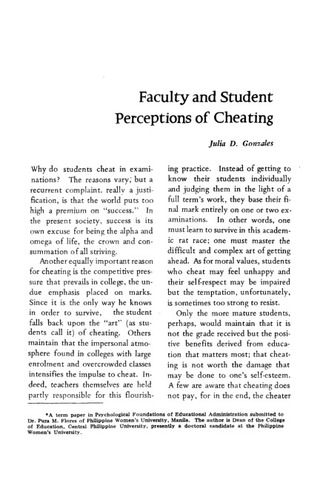Faculty and student perceptions of cheating
요약
Why do students cheat in examinations? The reasons vary, but a recurrent complaint, really a justi fication, is that the world puts too high a premium on “success.” In the present society, success is its own excuse for being the alpha and omega of life, the crown and consummation of all striving.
Another equally important reason for cheating is the competitive pressure that prevails in college, the undue emphasis placed on marks. Since it is the only way he knows in order to survive, the student falls back upon the “art” (as students call it) of cheating. Others maintain that the impersonal atmosphere found in colleges with large enrolment and overcrowded classes intensifies the impulse to cheat. Indeed, teachers themselves are held partly responsible for this flourishing practice. Instead of getting to know their students individually and judging them in the light of a full term’s work, they base their final mark entirely on one or two examinations. In other words, one must learn to survive in this academic rat race; one must master the difficult and complex art of getting ahead. As for moral values, students who cheat may feel unhappy and their self-respect may be impaired but the temptation, unfortunately, is sometimes too strong to resist.
Only the more mature students, perhaps, would maintain that it is not the grade received but the positive benefits derived from education that matters most; that cheating is not worth the damage that may be done to one’s self-esteem. A few are aware that cheating does not pay, for in the end, the cheater cheats himself.
Students clamor for change; they desire to change conditions and corrupt practices. If the movement for a higher standard of ethical behavior in college is to make any appreciable headway, it must find its dedicated leaders not only among teachers and administrators but also among the student body. It is time for them to grow up and accept responsibility for their actions. A new tradition, one based on honesty and honor and self-respect, can be established that each generation of college students will be proud to perpetuate.
The purposes of this investigation were: (1) to study a selected group of faculty members and undergraduate students at Central Philippine University with respect to their perceptions of cheating; (2) to determine the similarities and differences of agreement of non-cheating behavior; and (3) to determine whether or not there exists a difference between faculty and student perceptions of cheating.
This study attempted to answer the following problems: (1) What behavior situations of cheating were perceived in a different manner by both groups? (3) Do both groups perceive cheating in the same way? (4) If not, was the difference in agreement statistically significant? if so, how significant is the difference? From the study, the investigator tested the hypothesis that there is no difference in perceptions of cheating between faculty and students.
기술
Journal article
추천 인용
Gonzales, J. D. (1973). Faculty and student perceptions of cheating.유형
Article주제
Collections
- Southeast Asia Journal [188]


